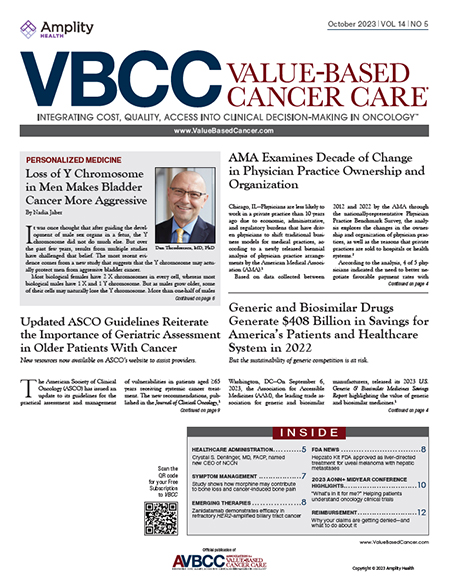Recent studies have revealed a drastic decrease in cancer screening rates due to the COVID-19 pandemic, suggesting that there will be an incoming tidal wave of more advanced and less curable cancers that should have been caught earlier. Results of a new study, which was published online ahead of the November issue of JCO Clinical Cancer Informatics, show that there were significant reductions in breast, colon, prostate, and lung cancer screenings during the first peak of the pandemic in April 2020, compared with April 2019.
The potential impact of these missed screenings on cancer care was a primary focus of discussion during the October 21 session of the Association for Value-Based Cancer Care (AVBCC) 10th Annual Summit.
“Anywhere from 30% to 60% of all cancer care is delivered in the community, not at tertiary care centers,” said session moderator Clifford Hudis, MD, FACP, FASCO, CEO of ASCO. “Patients want and expect the highest quality care where it’s convenient for them.”
COVID-19 has had a significant impact on community providers’ practices. Some practice locations closed temporarily or permanently; others were transformed into stopgap COVID-19 sites, forcing these practices to rethink their supply chain resources and putting a rapid jump-start on telehealth. The pandemic also exposed racial, ethnic, and economic disparities in healthcare.
Experts from Great Lakes Cancer Management Specialists, Northwest Medical Specialties, One Oncology, and Regional Cancer Care Associates brought their unique perspectives to these and other challenges in the 90-minute session.
Topics included how rapidly adopted practices such as telehealth and automation will be incorporated into community oncology going forward; strategies for controlling more components of the continuum of care and decreasing wastage; and the effect of the pandemic on clinical trials conducted in community oncology practices.
Many practices adopted creative clinical solutions guided by multidisciplinary tumor boards, said Carrie L. Dul, MD, FACP, of Great Lakes Cancer Management Specialists. “If we didn’t have OR availability, in some cases, we were able to adopt neoadjuvant endocrine therapy and work as a team on the sequence of surgery versus radiation and other options.”
To learn more, register for the AVBCC Summit and get access to all 10 weeks of valuable content!


